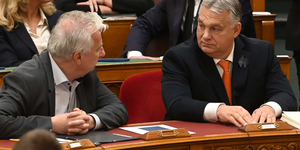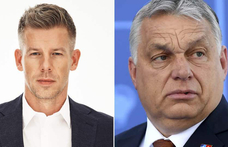Szent-Ivanyi on Hungarian foreign policy's weaknesses
The Hungarian government has failed to come up with an up-to-date vision of the nation. It should have thought more carefully about its line on American visas. The government must recognise the processes under way in Russia when it engages with the country. Alexandra Dobolyi, the Socialist MEP who has been spoken of as a potential foreign minister, should gain more experience before publicly expressing opinions on foreign policy. All this according to Istvan Szent-Ivanyi, an MEP, foreign policy committee member and foreign affairs spokesperson for the Free Democrats.
Istvan Szent-Ivanyi |
Istvan Szent-Ivanyi: The six countries in our region with a common policy on visas - the Czech Republic, Poland, Latvia, Lithuania, Romania and Slovakia - sent a joint declaration to Washington. Until that point, we had been members of this coalition, lobbying jointly for the visa restrictions affecting our citizens to be lifted. I believe it would have been appropriate for us to continue our cooperation with these partners, because only by acting together do we have a chance of getting the current visa regime lifted. A separate approach could end up implying that Hungary has a different view on visa affairs from the others and is less dedicated to protecting the interests of its citizens. We know the Foreign Ministry had some tactical reservations. They thought it would be wrong to attack the new American law on immigration directly, especially since President Bush has indicated that he would like to see Congress pass further amendments to the law.
hvg.hu: It's as if the Foreign Ministry concluded that the Washington cup was half full, while the others thought the cup was half empty.
I. Sz.: Something like that. The other countries also sensed that there had been progress with regard to visas, but they believe that less progress has been achieved than was earlier promised. The original draft of the law was more flexible, giving the American authorities the right to allow entry to citizens of all the countries concerned without further authorisation. On the other hand, the new law continues to specify that no more than 10 per cent of visa requests be rejected and adds further, unspecified, restrictions in cases of overstaying. It is still possible that any future regulations will be to our disadvantage. There is no doubt that much of the regulation about overstaying relates to fears about illegal employment. This might be relevant in the case of up to 25 per cent of Polish citizens in the US, but that figure is much lower in the case of Hungarian citizens. The law that has just been passed postpones the prospect of visa-free entry for citizens of the new democracies for at least another two years, and maybe as many as three or four. It would have been better if Hungary had joined the other countries in expressing its dissatisfaction with this situation, pointing out that, while we agreed with the original proposal, the existing legislation was unsatisfactory.
hvg.hu: Symbolically, too, it's a bad message to send, showing Hungary as the teacher's pet of the region.
I. Sz.: On that point, it's worth mentioning that there was no kind of agreement between the coalition countries on this step. I only learned about what had happened from the press - the other countries' ambassadors to Washington approached us, asking us to sign up to their initiative. On the other hand, I understand the Foreign Ministry's point of view. They think it is a purely technical question, one which doesn't require any kind of coalition agreement. But I think Hungary should have negotiated about its strategy with the other countries. We have to decide if we want to advance in cooperation with the other countries on this matter, or whether we want to pursue our own path. I am in favour of the former approach, especially since we have nothing to gain by being teacher's pet.
hvg.hu: Hungarian diplomacy isn't exactly excelling with regard to relations with Russia, either.
I. Sz.: Our relationship with Russia is one of the most critical aspects of Hungarian foreign policy. It's almost as if Hungary has completely failed to recognise the processes that are underway in Russia. Under Vladimir Putin's presidency, the democratisation process has shuddered to a halt, and serious problems have emerged with regard to the exercise of human and political rights. Hungary has begun emphasizing its independent approach at the moment when Europe begins to follow events in Russia with growing disquiet. I don't agree with this approach, and my party has also criticised it. At the same time, we don't agree with the Opposition, which is pursuing a strategy of "rhetorical Russophobia". I reject that, too. I sense an absence of sober pragmatism from our east European policy, the idea that, while promoting our own interests, we should give expression to our own, European principles. Washington has also questioned Ferenc Gyurcsany's statements in Moscow on the Nabucco and Blue Stream gas pipelines.
hvg.hu: As far as the Hungarian minorities in neighbouring countries are concerned, it's almost as if Hungarian diplomacy is following a comfortable laissez faire approach, allowing things to develop as they will.
I. Sz.: As far as the minorities of neighbouring countries are concerned, it looks like the Gyurcsany government has not yet made up its mind about what approach to take. We, the Liberals, agree with the institutional structure that has been developed in the recent past to defend the interests of the minorities. I'm thinking of institutions like the Hungarian Standing Council or the Illyes Foundation. At the same time, it has to be said that the coalition parties, including the Free Democrats, have failed to develop and implement an up-to-date conception of the nation. This is the reason why policy on minorities in neighbouring countries has just been hot air in recent years. In defence of the Hungarians, it should be admitted that the international environment has also declined, particularly in Slovakia, but also in Romania. It was disappointing when we realised that our assumption that EU membership would automatically solve many problems relating to nationalities or environmental policy was flawed. In the long-term, of course, European union will improve the situation of the Hungarian minorities, but that's a long way off.
hvg.hu: Will there be personnel changes at the top of the Foreign Ministry? Will the Socialists appoint another woman as minister? In the press, the name of your colleague in the European Parliament, Alexandra Dobolyi, has been floated semi-seriously.
I. Sz.: It's not certain that she would be the best choice. As a Socialist MEP she took two positions that I couldn't agree with. She publicly stated that everything was fine with regard to human rights in China, and that there was nothing lacking in Romania's approach to the rights of the Hungarian minority. I think my colleague still lacks the experience needed to speak publicly on such matters.
János Pelle


















